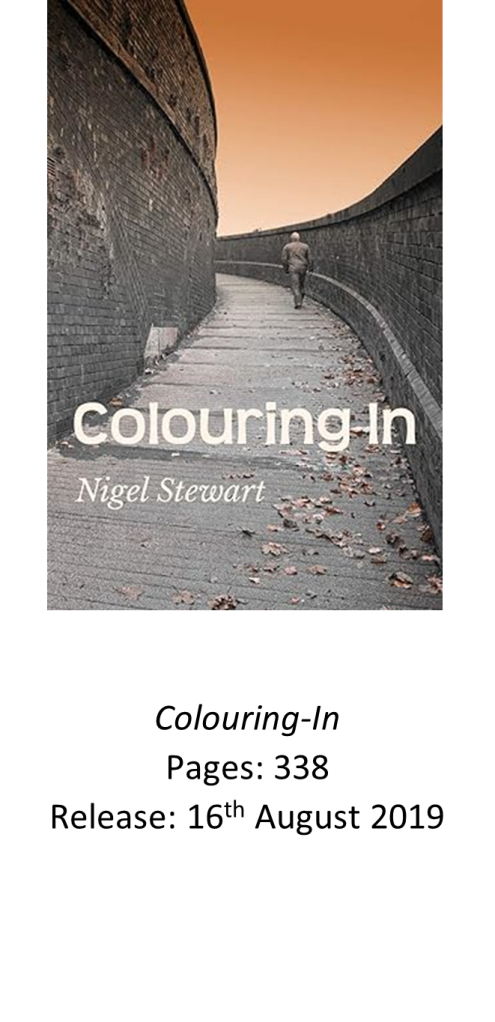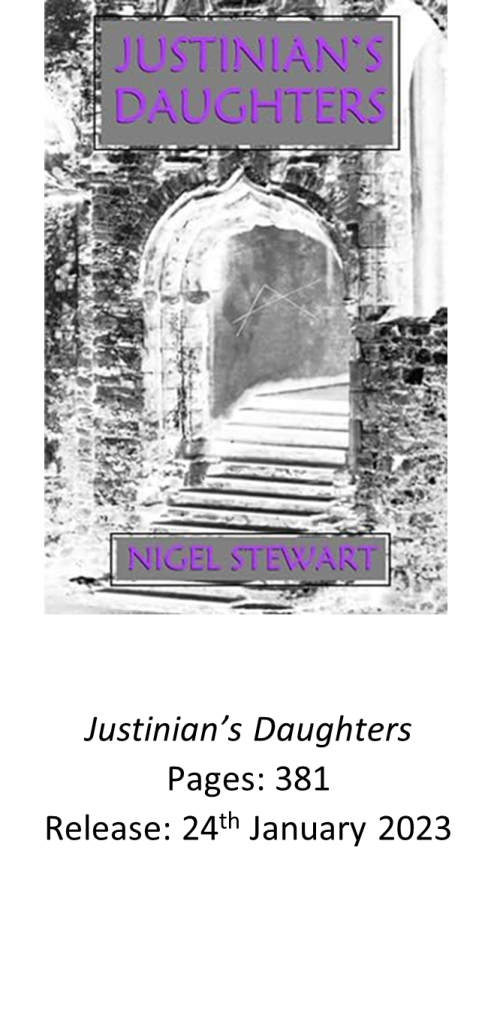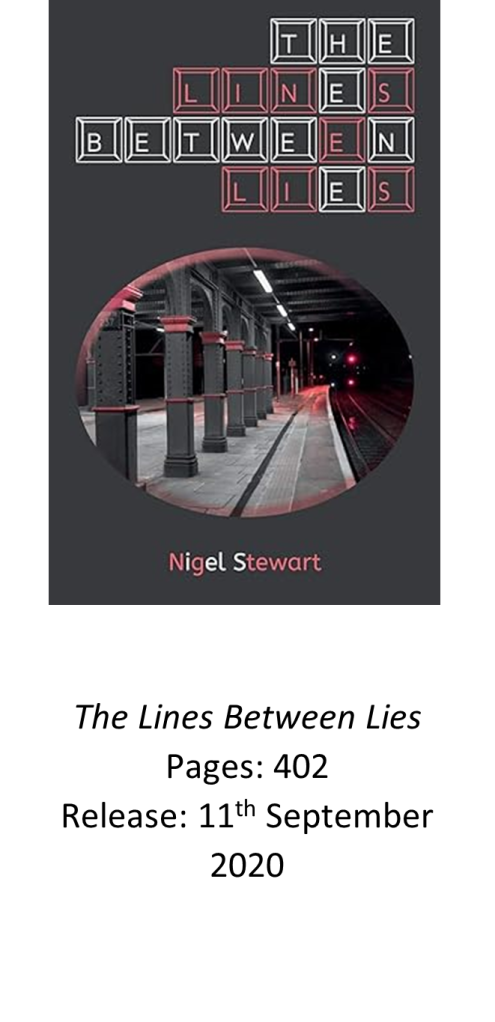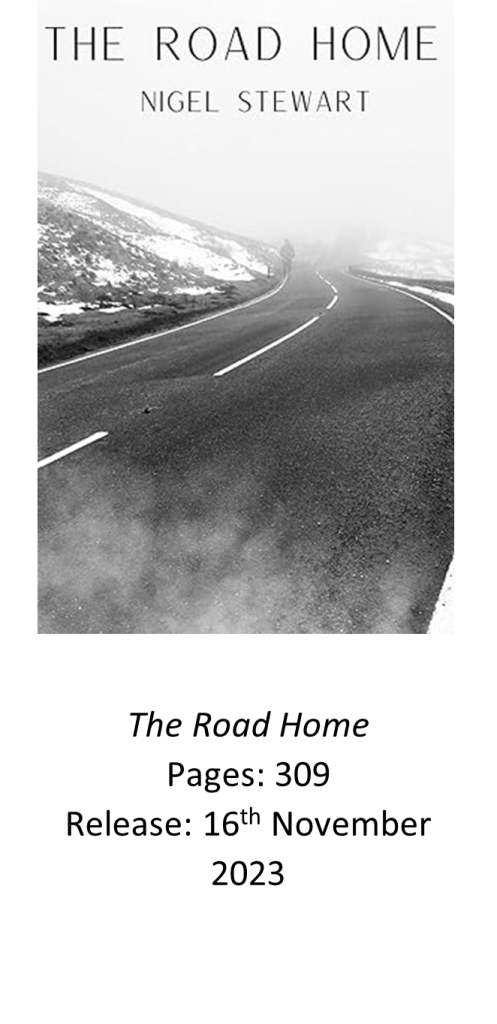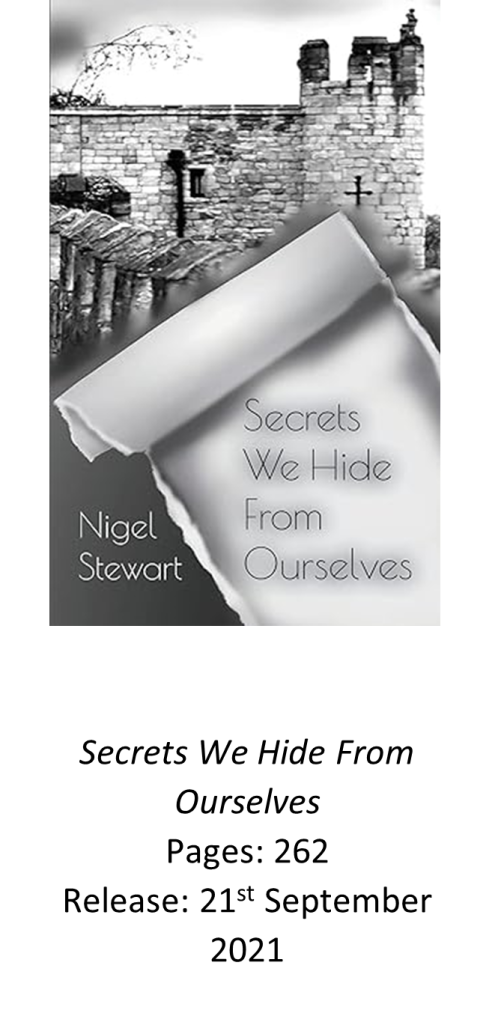
I live in Kirkham, Lancashire – about halfway between Blackpool and Preston. Originally from Northumberland, grew up in Hereford, spent early working life as a civil servant in Berkshire before that job was relocated to Lancashire in 1989. My children have flown to exciting new places so it’s just me and Fozzie, my adorable dog. I have a full-time day job, which is beyond boring but which pays the bills.
Before moving here, my main creative activity was as a musician. I learned piano from the age of nine, sang in a cathedral choir, learned the trumpet, played in youth orchestras and, from mid-teens played in rock bands. When I moved here, the local music scene didn’t interest me, so I decided to try writing a novel. 30 years later, that novel was published. The next 4 took a little less time.
There was no creative writing in my life aside from song lyrics until I was 30. But my working life always had a lot of written work in it: policy documents; training manuals; para-legal documents; tribunal submissions; contract drafting. That sort of stuff. I learned a great deal from it, in particular about clarity, brevity and structure.
What else? I’m a great cook, like a beer if one is available, drink a crazy amount of coffee and love the idea of spending the rest of my days living in France. I’ll be 65 in April, so putting a brave face on that.
Meet Nigel Stewart
Questions on Writing
What is the hardest part of your writing experience?
I genuinely don’t find many things that are hard about writing. That’s not to say it’s easy, because it isn’t. I’m just well-equipped to do it, have the ability to say to myself “come back to that and fix it later” if something feels wrong, and (best of all) have almost no distractions in my life. That’s a lucky place to be.
What have you learned about yourself when writing?
That I have an unstoppable imagination. That I can find a solution to any writing problem by being creative. That it’s something I can do for hours on end and just not feel tired.
Do you make yourself write everyday/regularly, or only when inspiration strikes?
I have put myself under a lot less pressure since the start of 2024. So, while I do try to write every day, I don’t panic if I don’t. The only fixed routine I have now is to write for 2.5 hours every Saturday and Sunday morning. The rest of the time, I just do what I can, when I can.
What does literary success look like to you?
Someone, anyone, reading my book and not only loving it but expressing how and why they loved it.
How much planning/world building do you do before writing, and how much comes along as you write?
This has changed as I’ve got into my stride as a writer. I was very driven by the need to have a plot plan and to have characters nailed down. I didn’t resist going off on tangents if I felt like it, but I was very structured and focussed on a fixed line with back stories, locations, relationships, and events. For Justinian’s Daughters, that changed because, while I had a very broad idea of the story, I had no idea how it would end – and the ending changed many times. For The Road Home, the whole thing was like a stream of consciousness. I just had a rough idea about a troubled bloke who needs to find love, and it flowed out of me. It’s the fastest I’ve ever written a book – just under four months. I spent more time researching it – travelling to those cathedrals – than I did writing the initial manuscript.
What drew you to write a novel about male mental health?
My own mental health became a problem during lockdown. Then my company made me a homeworker and it plunged me into a sense of terrible isolation. Yet I kept going and just assumed I had no choice to cope. When a friend told me she felt I had symptoms of depression I decided to see my GP. My symptoms were relatively mild and I benefitted from counselling. It taught me a lot about myself and in particular my relationship with my parents and lack of self-esteem. But another motivation for me was to reflect on denial about illness – not about MH as such. My brother died from cancer in 2010. He had known he was ill for years, had done nothing and told no one. So I used those experiences, then wrapped a fiction around them. For me the important point about Joe’s MH is that he doesn’t understand it’s a problem. He skips around it, even when someone tells him to get help, because he can’t give it a name. But I didn’t want to be too forensic about it or impose any expertise about the subject. I wanted his problems to be about his own sensory experiences, about denial and ignorance, and perhaps even for his problems to remain unresolved.
How do you celebrate when a book is published?
Nothing too elaborate or ostentatious. I’m pretty introverted, and not a party animal so, on the day itself, I give myself a huge pat on the back and call everyone who has helped me to thank them in person. A glass of champagne. A big wide smile.
Questions on Books and About You
Firstly, the most important question, what books are currently ‘on your bedside table’?
Sea Change by Jo Simpson, Christ on a Bike by Orla Owen, The Time Travellers Guide to Elizabethan England by Ian Mortimer, Man With a Seagull on His Head by Harriet Paige, and Lessons by Ian McEwan.
What children’s book would you suggest every adult read?
The Wind in the Willows. It teaches special things about how important home is.
What does your writing space look like?
Swivel chair. Small desk. Bluetooth keyboard. Mouse. Laptop riser. MacBook Air. Glasses case. Coasters. Small notebook, up to four pens and pencils. iPad to one side. On the wall above me, a graphic showing a character’s journey from the Forest of Dean to London (I use Magic Chart sheets as portable whiteboards). Behind me, another sheet divided into four sections, each with a bit of back story about groups and people in current work.
How many books do you think you own?
Perhaps 100. I don’t keep books.
Who is your literary icon?
Can I name two please? Evelyn Waugh, for his acid wit and peerless satire. Iain Banks for his excellent characters, dark ideas, humour, and humanity.
If you could own one rare/1st edition copy of a book, which would it be?
Far From the Madding Crowd by Thomas Hardy.
Is there an author who you always read?
It used to be Iain Banks, but I’m less focussed on individual writers these days because I want to read a span of styles. The only exceptions recently: two of Heidi James’ books (The Sound Mirror and Wounding); two by Kit de Waal (her short story collection Supporting Cast and her memoir Without Warning and only Sometimes); Sea Change is the second of Jo’s books that I’ll have read.
And finally, are there any plans for any new books? If so, what teasers can you give us?
Happy to tease. I have three projects on the go, but one is very much just ideas scribbled in a notebook. I don’t expect to do any work on it in 2024.
The second is a set of short stories, working title XV. These are finished but need a lot of re-work. Each story is fifteen years after the last, and each takes place at a time of some huge global event. So, we start in 1900 with two young Sheffield steelworkers discussing the new century, the Boer War and Germany’s ambitions. One of those characters moves into the next story, set in 1915 against the backdrop of the Great War and the Western Front – and so on, until 2020. Essentially, it’s scenes from ordinary lives while extraordinary times are in play. I’ve set aside time in the late summer to get these into shape, then it will be about getting beta readers involved.
The third project has really captured my imagination. It’s set in 16th century England, but I’m determined not to call it a historical novel, at least not in the accepted sense of the term. Instead, it’s about an insanely talented young musician, and the song he’s written to sing to his Queen. It’s also about the web of secrecy at that time and the ways his talents are usurped by the intelligence services. There’s so much to research, and I’m having such a good time working on this. Its working title is Matthew Marbury’s Madrigal.
Thank you Nigel😊You can have as many literary icons as you want!
Nigel Stewart’s Books
